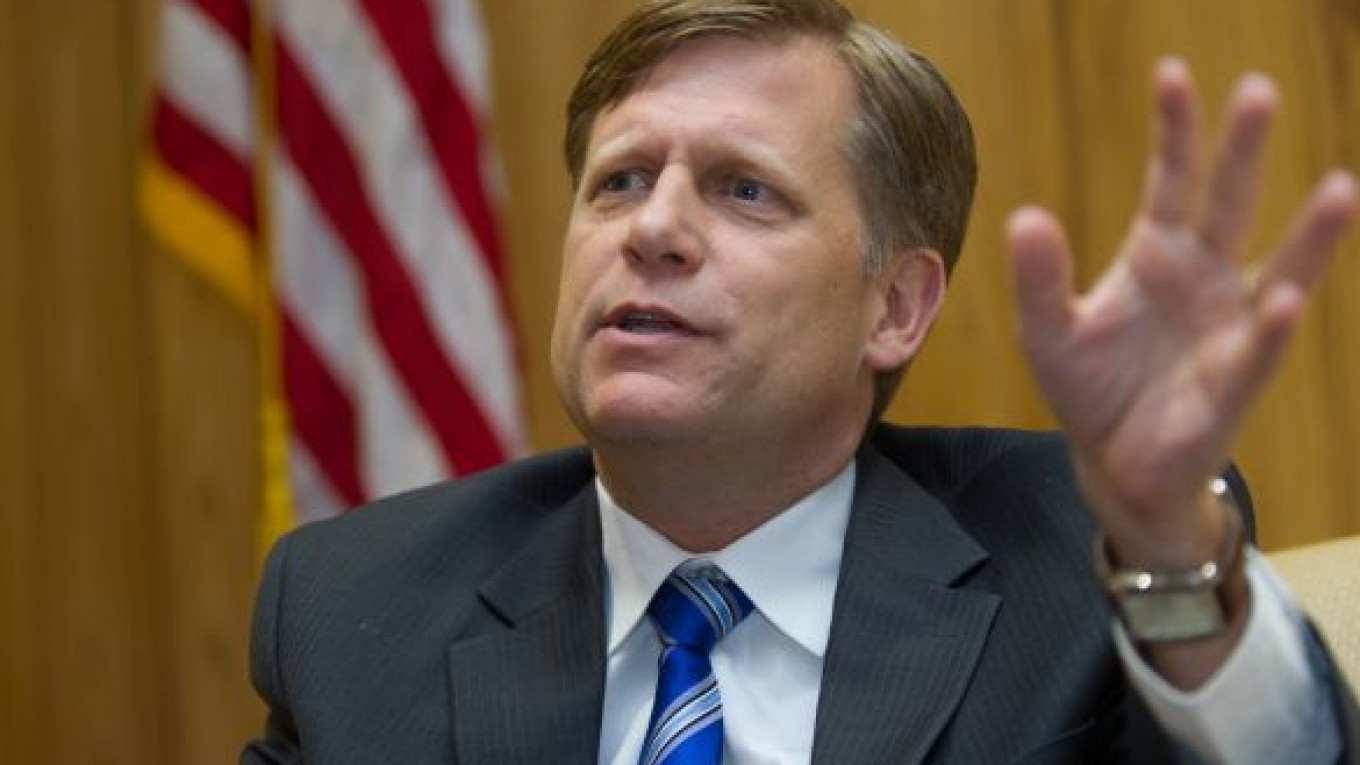U.S. Ambassador Michael McFaul found himself in hot water once again Tuesday, facing heavy criticism from the Kremlin and the Foreign Ministry over comments he made last week suggesting that Russia had “bribed” officials in Kyrgyzstan to pressure them to close a base used by U.S. forces.
The Foreign Ministry complained that the ambassador's remarks went "far beyond the bounds of diplomatic etiquette and present a deliberate distortion" of the U.S.-Russian dialogue.
An “ambassador's job, as we understand it, is to improve bilateral ties, not to spread blatant falsehoods through the media sphere,” the ministry said on its English-language Twitter late Monday.
President Vladimir Putin's foreign policy adviser Yury Ushakov followed up Tuesday by calling on McFaul to be more diplomatic.
“Ambassadors need to work on a positive agenda because there are already so many agents trying to ruin the atmosphere,” he told a news briefing, Interfax reported.
The Foreign Ministry said it was “utterly shocked” at McFaul's remarks during a talk with students at the Higher School of Economics on Friday.
In the talk, a transcript of which was on the school's website, McFaul suggested that Russia "bribed" Kyrgyzstan to close the Manas air base, which the United States has used since 2001 to support military operations in Afghanistan.
The Foreign Ministry also that “freedom of speech supporter Michael McFaul cast suspicion” on RT, the Kremlin-owned English-language TV channel formerly known as Russia Today.
"And what about Russia Today? What about articles of Russian politicians in large U.S. media outlets?” McFaul asked the students. "Isn't this meddling in our internal affairs? Can you imagine that an American politician publishes an article like that in Russian media?"
McFaul to the criticism on Twitter by saying his talk "highlighted over 20 positive results of the U.S.-Russian 'reset.'" He also maintained that his comment about RT had been taken out of context as he had said the channel's work was not meddling in U.S. internal affairs.
Kremlin adviser Ushakov, himself a former ambassador to Washington, suggested Tuesday that McFaul was harming the reset by creating “dissonances” between Moscow and Washington. On a more positive note, he added that the U.S. envoy had shown self-reflection.
“After each of his public antics he admits, “Sorry, guys, yes I blundered,” Ushakov said.
McFaul on Twitter on Monday that he was "still learning the craft of speaking more diplomatically."
Not a career diplomat but an academic who has written dozens of books on Russian democracy, McFaul is widely credited with hammering out the reset during his time as President Barack Obama's Russia adviser between 2008 and 2011.
The U.S. ambassador has been subject to an unprecedented storm of criticism since taking up office in January. State television has accused him of fomenting revolution by supporting the opposition, and he found himself in an ugly row after writing on Twitter that he suspected his e-mail was being hacked and his phone calls bugged.
Analysts said McFaul's openness just reflected his nondiplomatic background.
“The fact that Russia bribed Kyrgyzstan was well known before. But it is probably just not the thing for an ambassador to say,” said Alexei Malashenko, a scholar with the Carnegie Moscow Center, where McFaul worked in the 1990s.
A Message from The Moscow Times:
Dear readers,
We are facing unprecedented challenges. Russia's Prosecutor General's Office has designated The Moscow Times as an "undesirable" organization, criminalizing our work and putting our staff at risk of prosecution. This follows our earlier unjust labeling as a "foreign agent."
These actions are direct attempts to silence independent journalism in Russia. The authorities claim our work "discredits the decisions of the Russian leadership." We see things differently: we strive to provide accurate, unbiased reporting on Russia.
We, the journalists of The Moscow Times, refuse to be silenced. But to continue our work, we need your help.
Your support, no matter how small, makes a world of difference. If you can, please support us monthly starting from just $2. It's quick to set up, and every contribution makes a significant impact.
By supporting The Moscow Times, you're defending open, independent journalism in the face of repression. Thank you for standing with us.
Remind me later.







